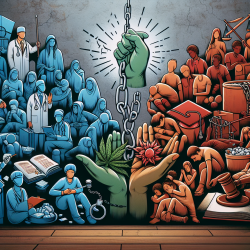Introduction
Stigma related to substance use is a profound barrier that affects the mental health and well-being of individuals, infringing on their human rights and dignity. The research article "Human Rights, Stigma, and Substance Use" by Wogen and Restrepo (2020) offers critical insights into the implications of stigma for a human-rights-based approach to improving mental health among those with drug dependence. This blog aims to highlight key findings from the research and encourage practitioners to implement these insights to improve their practice and outcomes for individuals facing substance use challenges.
Understanding Stigma and Its Impact
Stigma, as discussed in the research, is a multifaceted issue that manifests at various levels, including public, structural, courtesy, and self-stigma. Each type of stigma presents unique challenges and requires targeted interventions. Public stigma involves societal prejudice and discrimination, while structural stigma refers to policies that restrict opportunities for individuals with substance use problems. Courtesy stigma affects those associated with stigmatized individuals, and self-stigma occurs when individuals internalize negative stereotypes.
Implementing Person-First Language
One of the critical recommendations from the research is the use of person-first language. This approach emphasizes the individual rather than their condition, fostering dignity and respect. For example, referring to someone as a "person with a substance use problem" instead of an "addict" can significantly reduce stigma and improve self-perception and treatment outcomes. Practitioners should adopt this language in their interactions and documentation to create a more supportive and inclusive environment.
Policy Initiatives and Decriminalization
The research underscores the importance of policy initiatives, including the decriminalization of substance use, as a means to reduce stigma and promote human rights. Decriminalization can shift the perception of substance use from a criminal issue to a public health concern, encouraging more individuals to seek treatment without fear of legal repercussions. Practitioners can advocate for policy changes and support initiatives that align with a human-rights-based approach to substance use treatment.
Encouraging Further Research
While the research provides valuable insights, it also highlights the need for further studies on stigma related to substance use. Practitioners are encouraged to engage in research activities or collaborate with academic institutions to expand the evidence base. By contributing to the growing body of literature, practitioners can help develop more effective interventions and policies to combat stigma and improve outcomes for individuals with substance use problems.
Conclusion
Addressing stigma in substance use is crucial for protecting human rights and improving mental health outcomes. By implementing person-first language, advocating for policy changes, and engaging in research, practitioners can play a pivotal role in reducing stigma and promoting dignity and respect for individuals with substance use problems. To read the original research paper, please follow this link: Human Rights, Stigma, and Substance Use.










